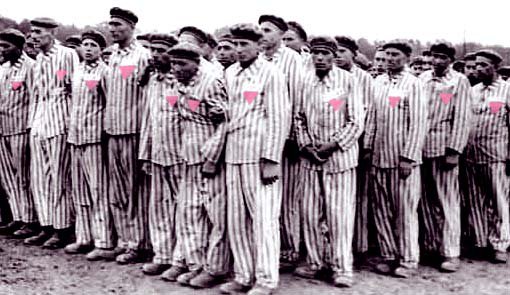Holocaust Memorial Day: Why history must not forget the Nazis’ deadly persecution of gay people
It would take decades for gay people's suffering at the hands of the Nazis to be acknowledged. We must never stop remembering, writes Hugh Kaye.

Words: Hugh Kaye
In a quiet area of Berlin’s Tiergarten Park is a strange concrete cube. It has a small window cut into it, through which you can see a 90-second video of two men kissing. This is the German capital’s memorial to the gay men and women persecuted, abused and murdered by the Nazis.
Today (27 January) is Holocaust Memorial Day, and – rightly – much of the focus will be, as it is every year, on the millions of Jews slaughtered by Hitler between 1933 and 1945. There will be some mention of the hundreds of thousands of gypsies murdered and a few passing words for other groups the Nazis found unacceptable. But there will be scant attention paid to the gay men who were victims of the Third Reich.
In fact, no one officially acknowledged they even were victims until decades after the Allies overran Berlin. That’s rather odd given that in 1935 SS leader Heinrich Himmler created something called the Reich Central Office for the Combating of Homosexuality and Abortion. Two years earlier he had said: “We must exterminate these people root and branch… the homosexual must be eliminated.”
It would be years until he was that forward about his plans for the Jews of Europe. It was not until the 1960s that the German government acknowledged past crimes against the LGBT+ community. An official apology would not be forthcoming until 2002. Yes, you read that right, it’s not a typing error – 2002.

The number of gay men who suffered under Nazi rule was small compared with the numbers of Jews murdered. Tiny, in fact. About 100,000 were arrested, of which maybe only 15,000 were sent to concentration camps. Almost nothing compared with the six million Jews hunted down and either shot into pits or marched off to the gas chambers of Auschwitz, Treblinka, Chelmo and Sobibor. But those sent to the camps were often singled out for the most brutal treatment, under a scheme which did not hide its function: Extermination Through Work.
Gay men were often given the most back-breaking tasks and suffered horrific torture – men’s fingernails were pulled out for the smallest infraction of the rules – or just for the fun of the SS guards – and many had their bowels purposely punctured.
At Buchenwald, gay men were subject to horrific pseudo-scientific experiments as the Germans looked for a “cure” for homosexuality (now where have we heard that used since?) These experiments included having a metal tube that released testosterone into their system sewn into their groin. Others were stripped naked and literally thrown to the dogs – to be mauled to death.
The persecution of gay men started almost the moment Hitler took power. The Gestapo drew up lists of known homosexuals and they were rounded up and arrested. Some died in custody, others were castrated. When liberation finally came, unlike other groups LGBT+ victims of those dark days often found themselves still imprisoned and on Germany’s version of the Sexual Offenders register: Homosexuality remained illegal in the Soviet-occupied eastern part of German until 1968, while those in the more-liberal West had to wait until 1969. And, again unlike other major groups, there was to be no compensation for their suffering – no reparations, no pensions.

Maybe the thing that makes the Nazis’ treatment of queer people still worrying today is that even for the times, it was a major step backwards. Although being gay was illegal in Germany before 1933, the police often turned a blind eye, particularly in major cities such as Berlin. The Weimar Republic, set up in the years after the Kaiser’s armies were defeated in World War One, took a very liberal view to sex and sexuality and there was a very real chance that being LGBT+ would have been decriminalised had not Hitler become chancellor in 1933.
Germany was a highly civilised, industrialised nation. The same backward step could happen again in any modern, developed nation. Remember.
